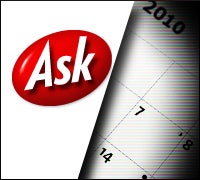 |
As part of its positioning as the top Web site to find answers, Ask.com unveiled the top questions of 2009 across several categories.
Ask.com said that among its more than 50 million monthly visitors, users are three times as likely to perform a search query in the form of a question than at any other search engine.
As a result, “Ask has unique insight into Americans’ attitudes about current events and their culture,” Doug Leeds, president of Ask.com U.S., said in a statement.
If that’s the case, health issues were top of mind for many folks visiting the site. The most asked question of 2009 was “How much should I weigh?”
Other health-related queries in the top ten included, “How do I get pregnant?” at No. 3, “How long does marijuana stay in your system?” (No. 8) and, “What are the systems of Swine Flu?” in ninth place.
One could also argue that No. 7 also belongs among the health-related queries:
“When will the world end?”
Economic concerns made it to second place: “How do I get out of debt fast?”
Rounding out the top ten were: “What is Twitter?” “What is Miley Cyrus’ phone number?” And “What is the meaning of life?” at Nos. 4, 5 and 6 respectively. The timepiece-challenged pushed “What time is it?” up to tenth place.
In addition to the Twitter query, the top ten technology-specific questions covered the basics:
“How do I make a Web site?”, “What does URL stand for?”, “How do I find my IP address?” and “What is an RSS feed?” filled out the first four positions, respectively. The rest of the top queries were similar pleas for basic information, like how to delete cookies, or what JavaScript is.
Another top-ten category covered personal finance, starting with, “What is a good credit score?”
The remainder of the top ten personal finance questions were far more specific: “How do I file for bankruptcy?” “How do I start my own business?” “What is a short sale in real estate?” “Who owns the Federal Reserve Bank?” “How much is the minimum wage? How do savings bonds work?”
In some cases, Ask provides direct answers. For example, for “How much should I weigh?”, the first result includes the entry boxes for height and weight as part of the Body Mass Index Calculator provided by Healthline.com.
In other cases, summaries and links are provided, such as a Wikipedia entry for Twitter.
Providing direct answers — rather than links — is an approach that many of the major search vendors are exploring as they add new services to their sites.
Ask, in particular, is moving to distinguish itself from other search engines with its focus on the query/answer paradigm. The company also told InternetNews.com recently that it plans to integrate social content into answers next year.
Ask.com’s full list of top questions, including several additional top ten categories, is available here.


